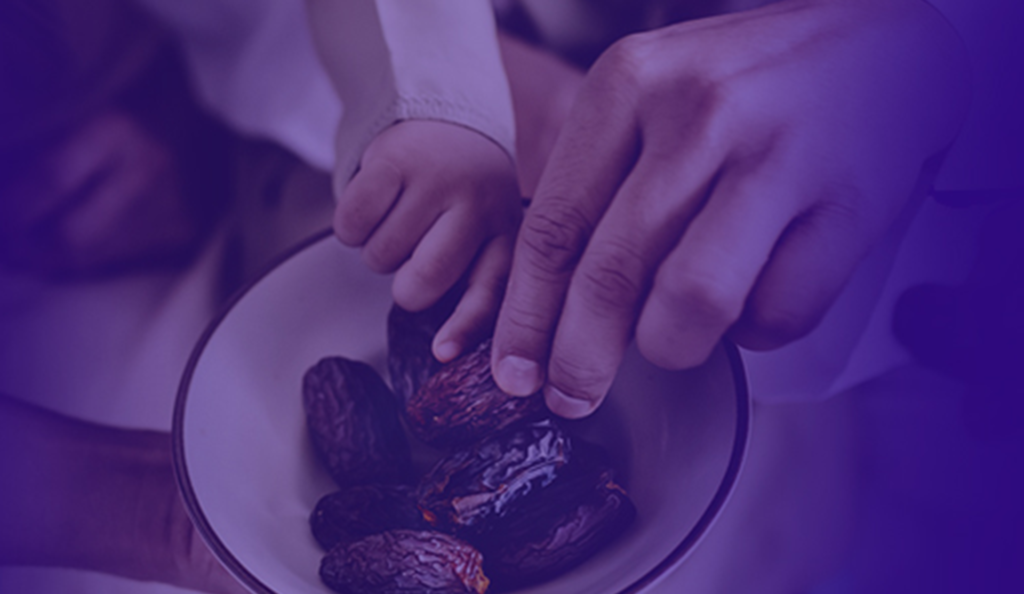Breaking The Fast And Starting The Conversation

This Ramadan, Break the Fast and Start the Conversation
“If any one of you is observing a fast, let him not utter obscene talk or raise his voice in anger, and if anyone insults him or wants to fight, let him say: I am a person who is fasting.”
In absence of negativity in the home environment, Ramadan provides a safe space for families to grow together. Communal eating at suhoor, the pre-dawn meal, and iftar, the meal to break fast, allows the space for members to bond over food, scheduling their day together which may otherwise be overlooked in other months.
“I heard my father say: ‘I heard ‘Umar bin Khattab say: “The Messenger of Allah (ﷺ) said: ‘Eat together and do not eat separately, for the blessing is in being together.”
You can offer to prepare iftar, or invite those who are alone, even if they’re not fasting, to keep them preoccupied in the spirit and traditions of this month.
“Whoever offers meal to his/her Muslim brother/sister at the time of iftar, s/he receives as much reward as s/he has earned. Nothing becomes less of the reward of those s/he offered meal to.”
“Verily in the remembrance of Allah do hearts find rest!” [Surat Ar-Ra’d, Verse 28]
ABOUT US
Naseeha provides our community with the tools needed to address mental health. With our confidential helpline, our youth receives immediate, anonymous, and confidential support over the phone from 12 PM – 3 AM, 7 days a week. With our educational programs, we raise awareness within the community the stigma around mental health.
ALL CONTACTS
- Unit 2, 5648 McAdam Rd Unit Mississauga, ON. L4Z1T2
- Helpline: 1 (866) 627-3342
- Admin Line: 905-890-2365
- info@naseeha.org
- 7 days a week (12PM to 3AM EST)
SUBSCRIBE
Stay up to date with the latest news and information on Naseeha.
Newsletter
STAY
CONNECTED!
Newsletter
Naseeha provides our community with the tools needed to address mental health. With our confidential helpline, our youth receives immediate, anonymous, and confidential support over the phone 24 hours a day, 7 days a week. With our educational programs, we raise awareness within the community the stigma around mental health.
USEFUL LINKS
- ABOUT US
- EVENTS
- RESOURCES
- GET SUPPORT
- DONATE
- -----------------------------------
- CRA Charitable ID
- 825501869RR0001
- IRS 501-c3 Tax ID
- 83-4406712
ALL CONTACTS
- Helpline: 1 (866) 627-3342
- Open 24 hours a day - 7 days a week
- ------------------------------------------------------------
- Canadian Address: Unit 2, 5648 McAdam Rd Unit Mississauga, ON. L4Z1T2
- US Address: 7199 S Kingery Hwy #1083 Willowbrook, IL 60527
- Canadian Admin Line: 905-890-2365
- US Admin Line: 630-756-5875
- Email: info@naseeha.net
ABOUT US
Naseeha provides our community with the tools needed to address mental health. With our confidential helpline, our youth receives immediate, anonymous, and confidential support over the phone from 12 PM – 12 AM, 7 days a week. With our educational programs, we raise awareness within the community the stigma around mental health.
ALL CONTACTS
- Unit 2, 5648 McAdam Rd Unit Mississauga, ON. L4Z1T2
- 7199 S Kingery Hwy #1083 Willowbrook, IL 60527
- Helpline: 1 (866) 627-3342
- Canada Admin Line: 905-890-2365
- US Admin Line: 630-756-5785
- info@naseeha.org
- 7 days a week (12PM – 3AM EST)
- 7 days a week (9AM – 12AM PST)
SUBSCRIBE
Stay up to date with the latest news and information on Naseeha.
Newsletter
- Naseeha - Copyright 2023
- CRA registered charity number: 825501869 RR0001
- US Federal Tax ID# 83-4406712




